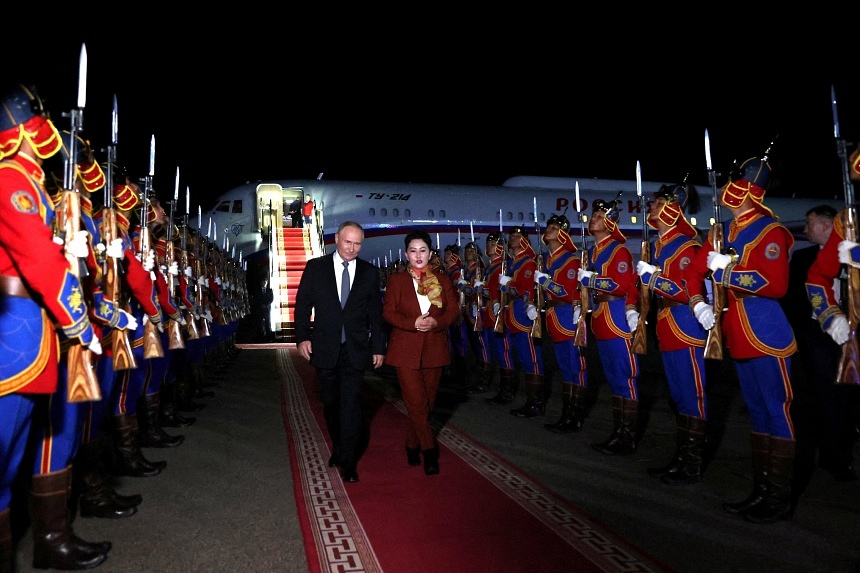ULAANBAATAR, Mongolia - Russian President Vladimir Putin was welcomed by honour guards and red carpets in the Mongolian capital on Sept 3 on his first visit to an International Criminal Court (ICC) member since it issued a warrant for his arrest in 2023.
Mr Putin landed in Ulaanbaatar on Sept 2 night at the start of a high-profile trip seen as a show of defiance against the court, Kyiv, the West and rights groups that have all called for him to be detained.
He met with Mongolian President Ukhnaagiin Khurelsukh on Sept 2 at Ulaanbaatar’s imposing Genghis Khan Square, also known as Sukhbaatar Square.
A band blared out martial tunes and the Russian and Mongolian national anthems as the two leaders stood in the square near Mongolian soldiers in traditional garb, with some on horseback.
Mr Putin is wanted by the Hague-based ICC for the alleged illegal deportation of Ukrainian children since his troops invaded the country in 2022.
Ukraine has reacted to the trip with fury, accusing Mongolia of “sharing responsibility” for Mr Putin’s “war crimes” after authorities did not detain him at the airport.
Kyiv had urged Mongolia to execute the arrest warrant, while the ICC said last week all its members had an “obligation” to detain those sought by the court.
In practice, there is little that can be done if Ulaanbaatar does not comply.
A vibrant democracy situated between giants Russia and China, Mongolia enjoys close cultural links to Moscow as well as a critical trading relationship with Beijing.
Mongolia was under Moscow’s sway during the Soviet era but has sought to keep friendly relations with both the Kremlin and Beijing since the Soviet collapse in 1991.
The country has not condemned Russia’s offensive in Ukraine and has abstained during votes on the conflict at the United Nations.
The Kremlin said last week it was not concerned that Mr Putin would be arrested during the visit.
“Obviously, there was no chance of arresting Putin,” Mr Bayarlkhagva Munkhnaran, a political analyst and a former adviser on Mongolia’s National Security Council, told AFP.
“In Ulaanbaatar’s view, the current ICC warrant-related scandal is a passing matter compared to the need to maintain secure and predictable relations with the Kremlin,” he said.
‘Get Putin out of here’
The Genghis Khan Square was decked out with huge Mongolian and Russian flags for Mr Putin’s first visit to the country in five years.
A day earlier, a small protest had gathered there, with a handful of demonstrators holding a sign demanding “Get war criminal Putin out of here”.
Tight security prevented another protest planned for Sept 3 from getting near Mr Putin.
The protesters instead gathered around a block from the Monument for the Politically Repressed, which honours those who suffered under Mongolia’s decades-long Soviet-backed communist regime.
Mr Putin’s visit is being held to mark the 85th anniversary of a decisive victory against Imperial Japan by Mongolian and Soviet forces.
Mr Putin pointed to a number of “promising economic and industrial projects” between the two countries in an interview with Mongolian newspaper Unuudur shared by the Kremlin.
Among those was the construction of the Trans-Mongolian gas pipeline linking China and Russia, he said.
The Russian president also said he was “interested in pursuing substantive work” towards a trilateral summit between himself, Mongolian and Chinese leaders.
‘A fugitive from justice’
Mongolia’s government has not commented on the calls to arrest Mr Putin.
But a spokesman for President Ukhnaagiin Khurelsukh took to social media on Sept 1 to deny reports that the ICC had sent a letter asking it to execute the warrant when he visits.
Russia does not recognise the jurisdiction of the ICC.
And Amnesty International warned on Sept 2 that Mongolia’s failure to arrest Mr Putin could further undermine the ICC’s legitimacy, while emboldening the ex-KGB spy, in power for almost a quarter of a century.
“President Putin is a fugitive from justice,” Ms Altantuya Batdorj, executive director of Amnesty International Mongolia, said in a statement.
“Any trip to an ICC member state that does not end in arrest will encourage President Putin’s current course of action and must be seen as part of a strategic effort to undermine the ICC’s work.” AFP

